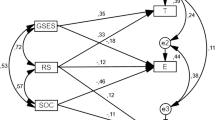Abstract
The interrelationships of coping responses, self-control and trait anxiety in Israeli university students during the 1991 Gulf war were investigated. Respondents (35 male and 58 female students) responded to a battery of questionnaires at the end of the war to assess these variables. Their responses, which referred to the sealed room situation, were characterized by attempts to help others and relatively low emotion-focused reactions. Based on factor analysis, a three-factor structure of response modes is suggested: instrumental, emotion-focused and blunting-like. Self-control was found to be associated with a lower intensity of the emotion-focused response mode. Trait anxiety did not correlate with any of the response modes.
Similar content being viewed by others
References
Baum, A., Fleming, R., and Singer, J. E. (1983). Coping with victimization by technological disaster.J. Social Illness 39:: 117–138.
Carver, C. S. Scheier, M. F., and Weintraub, J. K. (1989). Assessing coping strategies: A theoretical based approach.J. Personal. Social Psychol. 56: 267–283.
Collins, D. L., Baum, A., and Singer, J. E. Coping with chronic stress at Three Mile Island: Psychological and biochemical evidence.Health Psychol. 2: 149–166.
Campas, B. E., Nakarne, V. L., and Fondacavo, K. M. (1988). Coping with stressful events in older children and younger adolescents.J. Consult. Clin. Psychol. 56: 405–411.
Endler, N. S. (1988). Hassles, health and happiness. In Janisse, M. P. (ed.),Individual Differences, Stress and Health Psychology New York, Springer, pp. 24–56.
Endler, N. S., and Parker, J. D. A. (1990). Multidimensional assessment of coping: A critical evaluation.J. Personal. Social Psychol. 58: 844–854.
Folkman, S. (1984). Personal control, stress and coping processes: A theoretical analysis.J. Personal. Social Psychol. 45: 839–852.
Folkman, S., and Lazarus, R. S. (1980). An analysis of coping in a middle-aged community sample.J. Health Social Behav. 21: 219–233.
Folkman, S., and Lazarus, R. S. (1985) If it changes it must be a process: Study of emotion and coping during three stages of college examination.J. Personal. Social Psychol. 48: 150–170.
Klingman, A., Sagi, A., and Raviv, A. (1993). The effect of war on children. In Leavitt, L. A., Fox, N. A. (eds.),Psychological Effects of War and Violence on Children Lawrence Erlbaum Associates, Hillsdale, NJ., pp. 75–92.
Lazarus, R. S., and Folkman, S. (1984).Stress, Appraisal and Coping Springer, New York.
Lobel, T. E., Gilat, I., and Endler, N. S. (1993). The Gulf War: Distressful reaction to scud missile attacks.Anxiety, Stress and Coping 6: 9–23.
Milgram, N. A. (1982). War related stress in Israeli children and youth. In Goldberg, L. and Breznitz, S. (eds.),Handbook of Stress: Theoretical and Clinical Aspects Free Press, New York, pp. 656–676.
Miller, S. M. (1990). To see or not to see: Cognitive information styles in the coping process. In Rosenbaum, M. (ed.),Learned Resourcefulness: On Coping Skills, Self-Control and Adaptive Behavior Springer, New York, pp. 95–126.
Rosenbaum, M. (1980). A schedule for assessing self-control behaviors: Preliminary findings.Behav. Ther. 11: 109–121.
Rosenbaum, M. (1990). Role of learned resourcefulness in self control of health behavior. In Rosenbaum, M. (ed.),Learned Resourcefulness: On Coping Skills, Self-Control, and Adaptive Behavior Springer, New York, pp. 3–30.
Rosenbaum, M. and Rolnick, A. (1983). Self-control behaviors and the coping with seasickness.Cogn. Ther. Res. 7: 93–98.
Shore, J. H., Tatum, E. L., and Vollmer, W. M. (1986). Psychiatric reactions to disaster: The Mount St. Helens experience.J. Nerv. Ment. Dis. 177: 681–685.
Spielberger, C. D. (1972). Anxiety as an emotional state. In Spielberger, C. D. (ed.),Anxiety: Current Trends in Theory and Research Academic Press, New York, Vol. 1, pp. 24–49.
Spielberger, C. D., Barker, L., Russell, S., Sliva de Crame, R., Westberry, L., Knight, J., and Marks, E. (1979).Preliminary Manual for the State-Trait Personality Inventory (STPPI) University of South Florida, Tampa, FL.
Swenson, C., and Klingman, A. (1993). Children and war. In Saylor, C. F. (ed.),Children and Disasters Plenum, New York, pp. 137–163.
Teichman, Y., and Melnic, C. (1979). The Hebrew manual for the State-Trait Anxiety Inventory. Tel-Aviv: Tel Aviv University.
Torestad, B., Mugnusson, D., and Olah, A. (1990). Coping, control, and experience: An interactional perspective.Anx. Res. 3: 1–16.
Vitaliano, P. P., Russo, J., Carr, J. E., Maiuro, R. D. and Becker, J. (1985). The Ways of Coping checklist: Revision and psychometric properties.Multivar. Behav. Res. 20: 3–26.
Weisenberg, M., Schwarzwald, J., Waysman, M., Solomon, Z., and Klingman, A. (1993). Coping of school-age children in the sealed room during Scud missile bombardment and postwar stress reactions.J. Consult Clin. Psychol. 61: 462–467.
Author information
Authors and Affiliations
About this article
Cite this article
Klingman, A., Kupermintz, H. Response style and self-control under scud missile attacks: The case of the sealed room situation during the 1991 Gulf war. J Trauma Stress 7, 415–426 (1994). https://doi.org/10.1007/BF02102786
Issue Date:
DOI: https://doi.org/10.1007/BF02102786




